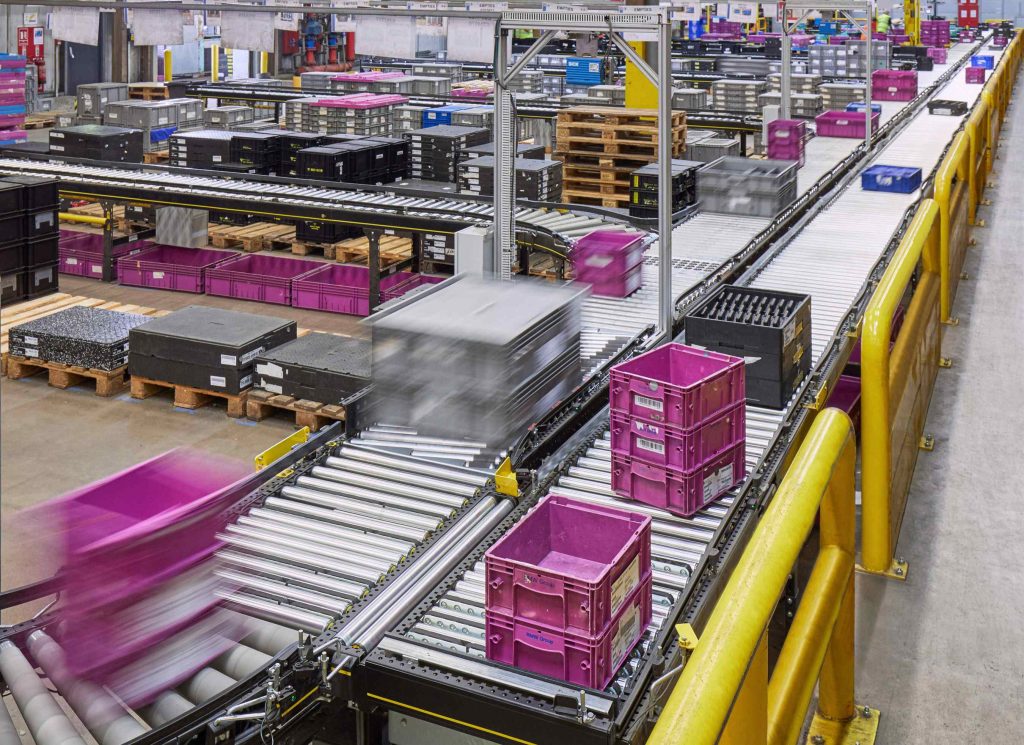Case Study: Tote Sortation Project for Leading Car Maker
30th August 2018

Leicester based, BS Handling Systems has completed an automated sortation project for the BMW Group at its MINI plant in Oxford. The sortation system has been designed to sort and return empty totes and pallets in the ILC building (80) at the Oxford plant.
Located in the Rudolph and Hellmann controlled area, BS Handling has installed an 80 metre loop roller conveyor which sorts empty totes by both colour and size. The company has also installed a further 30 metre pallet chain conveyor for the transportation and strapping of pallets. Car parts are delivered to the MINI plant in totes of various sizes and colours. These parts are then stored in the totes until needed for just-in-time continuous production. Once the parts have been used in production, operators transport the empty totes from the manufacturing factory to the ILC building (80). Here, operators then place the empty totes onto the start of the roller conveyor line.
The roller conveyor features eight 10 metre long sortation chutes which sort the totes by colour and size. The first two chutes use a SICK volumetric scanner to ensure the totes are sorted by both the correct colour and size criteria. The remainder of the chutes sort the totes by colour only. If the roller conveyor cannot sort the tote because, for example, it is unable to read the colour of the tote or the sortation chutes are full, the tote will carry on round the conveyor and is moved via a cross transfer so that the opposite side of the tote is presented for scanning.
Once the totes reach the end of each sortation chute, they are manually stacked on pallets. When the pallets are full, the operators place lids onto the pallet stacks and then use powered stacker trucks to transport them to the pallet chain conveyor. At the Oxford facility, the sortation system deals with a higher volume of pink totes than any other colour. In order to accommodate for this higher throughput, BS Handling Systems designed and installed the pallet conveyor to sit between the pink tote sortation chutes, with extra pallet loading stations. This reduces the distance operators need to move the pallets for the higher volume of pink pallet stacks.
When loaded, the chain conveyor takes the pallets through the building and into a separate facility. Here, the chain conveyor feeds the pallets to a strapping machine which then double straps the pallets ready for despatch. At the end of the conveyor, the pallets are unloaded by fork lift truck and are stored in the yard ready for collection by the supplier.
Rob Smith, managing director at BS Handling Systems concludes: “The challenge for us was to provide an automated solution for sorting and storing empty totes and pallets at MINI plant Oxford. The operators were previously manually sorting the totes and moving them on foot. They would then stack them onto pallets and strap them by hand. However this was very time consuming and the operators found it difficult to manage the increasingly high volume of totes.
“The automated sortation system in the ILC building (80) has been designed to handle up to 1250 totes per hour and is operational 22 hours a day, five days a week. The system has improved efficiencies at the Oxford MINI plant and freed operators to focus on more important tasks in the production plant.”

